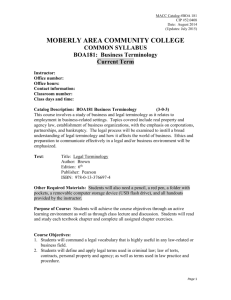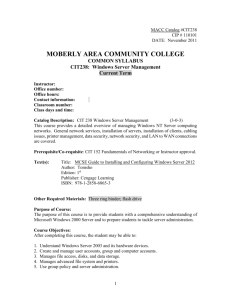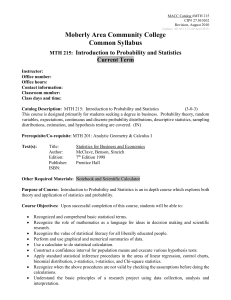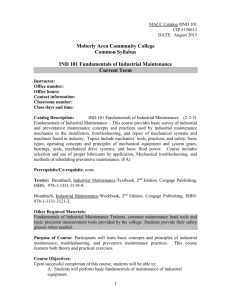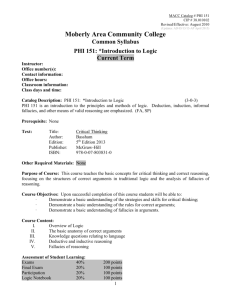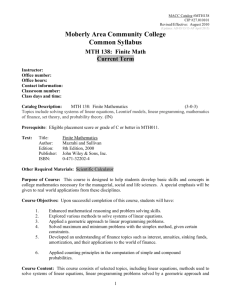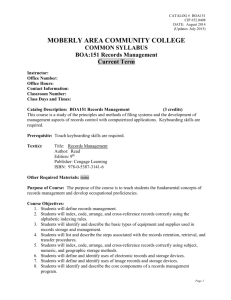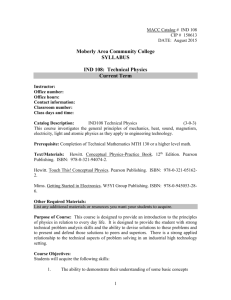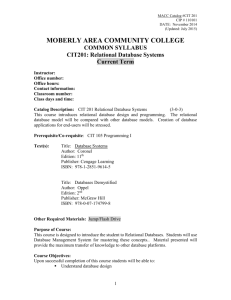BOA152: Business Math/Electronic Calculations
advertisement
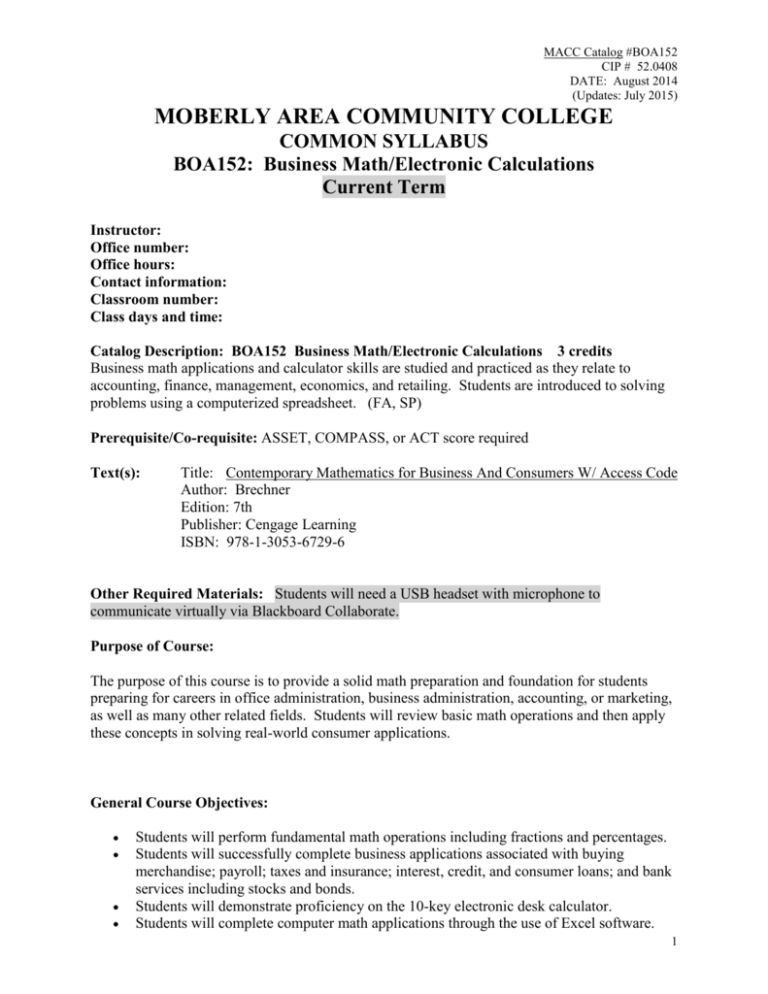
MACC Catalog #BOA152 CIP # 52.0408 DATE: August 2014 (Updates: July 2015) MOBERLY AREA COMMUNITY COLLEGE COMMON SYLLABUS BOA152: Business Math/Electronic Calculations Current Term Instructor: Office number: Office hours: Contact information: Classroom number: Class days and time: Catalog Description: BOA152 Business Math/Electronic Calculations 3 credits Business math applications and calculator skills are studied and practiced as they relate to accounting, finance, management, economics, and retailing. Students are introduced to solving problems using a computerized spreadsheet. (FA, SP) Prerequisite/Co-requisite: ASSET, COMPASS, or ACT score required Text(s): Title: Contemporary Mathematics for Business And Consumers W/ Access Code Author: Brechner Edition: 7th Publisher: Cengage Learning ISBN: 978-1-3053-6729-6 Other Required Materials: Students will need a USB headset with microphone to communicate virtually via Blackboard Collaborate. Purpose of Course: The purpose of this course is to provide a solid math preparation and foundation for students preparing for careers in office administration, business administration, accounting, or marketing, as well as many other related fields. Students will review basic math operations and then apply these concepts in solving real-world consumer applications. General Course Objectives: Students will perform fundamental math operations including fractions and percentages. Students will successfully complete business applications associated with buying merchandise; payroll; taxes and insurance; interest, credit, and consumer loans; and bank services including stocks and bonds. Students will demonstrate proficiency on the 10-key electronic desk calculator. Students will complete computer math applications through the use of Excel software. 1 MACC Catalog #BOA152 CIP # 52.0408 DATE: August 2014 (Updates: July 2015) Course Content: Review of Basic Math Whole numbers, fractions, decimals, basic equations, percent’s Real-World Business Applications Checking accounts Invoices, trade discounts, cash discounts Markup and markdown Payroll Simple interest and promissory notes Compound interest and present value Annuities Consumer and business credit Mortgages/Taxes and Insurance Investments Math Applications using MS Excel Spreadsheets (Extra Credit) CengageNow.com Homework Tutorial Software (Internet Required) “Statement to Connect Course with Technical Education Program Objectives:” In compliance with MACC’s Business Office Administration Program Assessment Plan, the student who successfully completes this course will be able to meet the following Program Objectives: Develop speed and accuracy of numeric data using the numeric keypad. Demonstrate correct touch keypad skill. Demonstrate ability to correctly enter numeric data from source documents with industry standard speed and accuracy. Master the financial skills necessary for preparing a bank reconciliation. Use an electronic calculator to perform a bank reconciliation. Understand the concept of a bank reconciliation. Master general mathematical skills with the use of an electronic calculator. Master speed and accuracy in performing addition on an electronic calculator. Master speed and accuracy in performing subtraction, multiplication and division on an electronic calculator. Assessment of Student Learning: Grading: Grades are determined on the basis of examination scores and written homework assignments and class participation. Counseling with the student when the need arises to evaluate his/her efforts and/or weaknesses also plays a part in grading. The grading scale is: A = 90%, B = 80%, C = 70%, D = 60%. Program Assessment of Student Learning: The Business and Office Administration faculty continually strive to meet the needs of their students through program improvements. These improvements are a result of program assessments and the consultation and advisement of the BOA Advisory Committee. In addition to the course assessments outlined in this syllabus, the objectives achieved in this course will also be an integral part of the Business Office Administration program 2 MACC Catalog #BOA152 CIP # 52.0408 DATE: August 2014 (Updates: July 2015) assessment. BOA students will be assessed on the mastery of course concepts and essential skills attained in this course during the capstone course, BOA Capstone. Instructor Policies: Attendance: Any student who misses two consecutive weeks of class during a regular sixteen-week semester or the equivalent proportion of class time during a shorter session will be dropped from the class by the instructor unless acceptable justification is supplied. Additionally, any student who misses more than one-fourth of the entire number of in-seat class meetings in a regular 16-week semester or the equivalent proportion of class time during a shorter session, may be dropped from that class by the instructor if, in the opinion of the instructor, the student does not have reasonable opportunity to succeed in the class. Student attendance must be defined in a different manner for online, hybrid, and virtual courses. Student attendance in these courses is defined as active participation in the course. Online, hybrid, and virtual courses will, at a minimum, have weekly mechanisms for student participation, such as any or all of the following methods: a. Completion of quizzes or exams b. Submission of assignments c. Participation in threaded discussions d. Communication with the instructor A student who does not participate in an online, hybrid, or virtual course for two consecutive weeks will be dropped by the instructor unless acceptable justification is supplied. Tardiness: per instructor’s policy Make-up and late work: per instructor’s policy Extra-Credit: per instructor’s policy Schedule of Student Assignment and Activities: (per instructor) College Policies/Procedures: Americans with Disabilities Act: Students who have disabilities that qualify under the Americans with Disabilities Act may register for assistance through the Office of Access and ADA Services. Students are invited to contact the Access Office to confidentially discuss disability information, academic accommodations, appropriate documentation and procedures. For more information, please call either the Moberly office at (660) 263-4100 x 11240 or the Columbia office at (573) 234-1067 x 12120, or visit our web page at http://www.macc.edu/index.php/services/access-office. 3 MACC Catalog #BOA152 CIP # 52.0408 DATE: August 2014 (Updates: July 2015) Title IX Statement MACC maintains a strict policy prohibiting sexual misconduct in any form, including sexual harassment, sexual discrimination, and sexual violence. All MACC employees, including faculty members, are considered mandated reporters of sexual misconduct and as such are expected to contact the Title IX Coordinator when they become aware, in conversation or in writing, of an incident of sexual misconduct. For more information on this policy or to learn about support resources, please see http://www.macc.edu/sexual-misconduct-policy or contact Dr. Jackie Fischer, MACC’s Title IX Coordinator, at 660-263-4110, ext. 11236 or jackief@macc.edu. Parental Responsibility for Children: Students who are parents have the responsibility to arrange for suitable care of their children while they attend class. Students should not bring children to class: nor should children be left unattended anywhere on campus. Procedures to protect the safety and welfare of unattended children will be handled by the College. (Student Handbook) Academic Dishonesty MACC board policy is as follows: “Academic dishonesty by students damages institutional credibility and unfairly jeopardizes honest students; therefore, it will not be tolerated in any form.” Forms of academic dishonesty include but are not limited to the following: violations of copyright law, plagiarism, fabrication, cheating, collusion, and other academic misconduct. Incidents of dishonesty regarding assignments, examinations, classroom/laboratory activities, and/or the submission of misleading or false information to the College will be treated seriously. The procedure for handling academic dishonesty is outlined in the Student Handbook (Policy Handbook M.010). In cases of alleged academic dishonesty, the burden of proof is on the student, not on the instructor. 4



